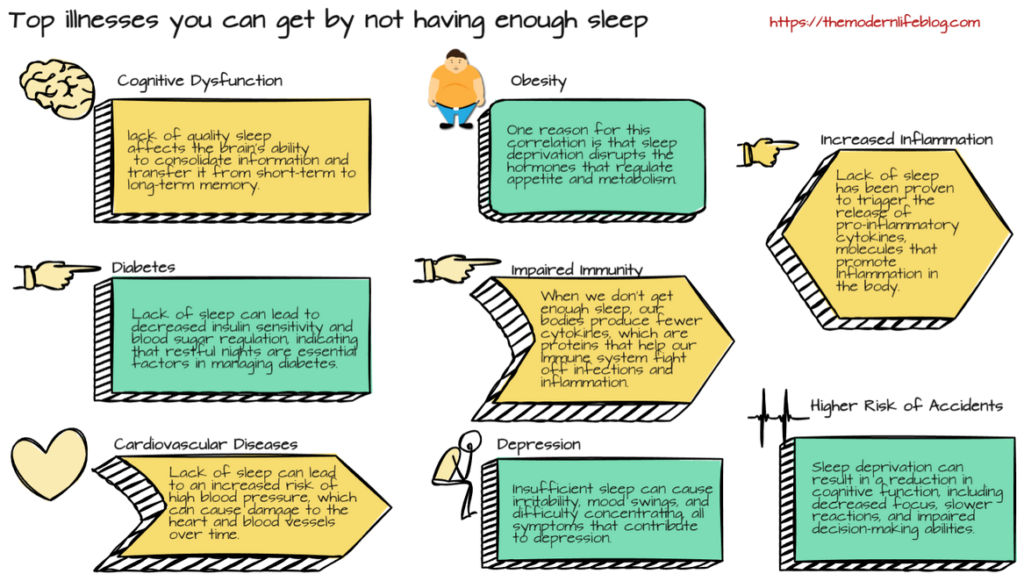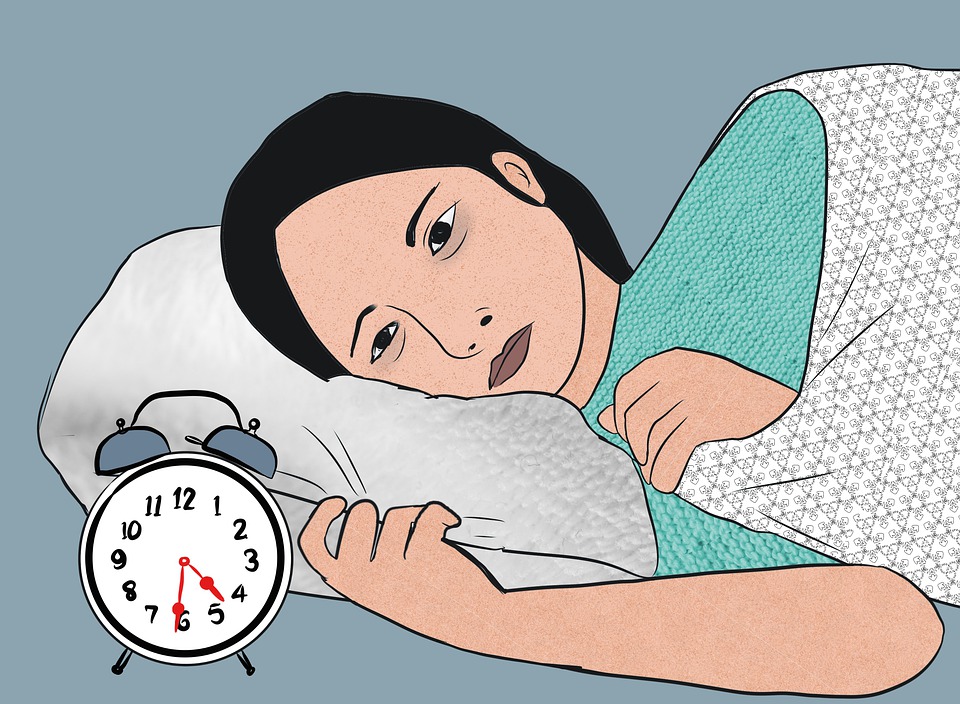As humans, sleep is an integral part of maintaining proper physical and mental health. However, in today’s fast-paced world, many of us tend to prioritize work and other activities over our sleeping habits. Unfortunately, this lack of sleep can have a significant impact on our body’s ability to function correctly and lead to the development of various illnesses. The effects of sleep deprivation are widespread, and they can manifest in both the short and long term. In this blog post, we will delve deeper into the topic of sleep deprivation and highlight the top illnesses that you could develop without enough rest. From cardiovascular disease, diabetes, and obesity to mood disorders such as depression and anxiety, the impacts of sleep deprivation can be extensive and far-reaching. It’s crucial to recognize the significance of a good night’s rest and the potential consequences of neglecting it. We’ll be exploring the science behind how sleep deprivation affects our bodies, the symptoms to watch out for, and ways to improve your sleeping habits to help prevent the development

1. Cognitive Dysfunction
Sleep deprivation can have serious implications on your cognitive function and result in cognitive dysfunction. This is because a lack of quality sleep affects the brain’s ability to consolidate information and transfer it from short-term to long-term memory. As a result, individuals may experience impaired judgment, difficulty with decision-making, reduced reaction time, and a decrease in creativity and critical thinking abilities. If left untreated, this could lead to more severe cognitive impairments such as memory loss and ultimately impact your overall quality of life. If you experience signs and symptoms of sleep deprivation including difficulty falling asleep, waking up frequently during the night, or feeling tired and groggy during the day, it is important to seek medical attention to prevent long-term cognitive damage.
2. Diabetes

Sleep deprivation may increase the risk of developing diabetes, particularly in individuals with existing diabetic conditions or predisposition. Several clinical studies have shown that sleep deprivation results in higher levels of glucose in the bloodstream, reduced insulin sensitivity, and other metabolic dysfunction. Lack of sleep can lead to decreased insulin sensitivity and blood sugar regulation, indicating that restful nights are essential factors in managing diabetes. While the exact mechanisms behind the relationship between sleep deprivation and diabetes are not yet clearly understood, it is critical to monitor the signs and symptoms of sleep deprivation to prevent exacerbation of existing health conditions like diabetes. The most common signs of sleep deprivation include fatigue, mood changes, and difficulty concentrating. Furthermore, individuals with existing diabetic conditions may experience heightened symptoms, including increased thirst, frequent urination, and changes in body weight. Thus, proper rest and adequate sleep are necessary to maintain overall health and reduce the risk of developing chronic illnesses.
3. Cardiovascular Disease
Cardiovascular disease is a serious health condition that can occur due to sleep deprivation. It is important to recognize the possible signs and symptoms of sleep deprivation in order to prevent this illness from developing. Lack of sleep can lead to an increased risk of high blood pressure, which can cause damage to the heart and blood vessels over time. In addition, sleep deprivation can also increase inflammation in the body, which can contribute to the development of cardiovascular disease. Common signs of sleep deprivation include difficulty falling or staying asleep, excessive daytime sleepiness, and irritability. If left untreated, sleep deprivation can have serious detrimental effects on the body and may increase the risk for a multitude of health issues, including cardiovascular disease. Seeking medical attention early on can help prevent the onset of this and other serious illnesses.
4. Obesity
Obesity is a serious medical condition that can be exacerbated by sleep deprivation. In fact, studies have shown that people who suffer from chronic sleep deprivation may be up to 55% more likely to become obese. One reason for this correlation is that sleep deprivation disrupts the hormones that regulate appetite and metabolism. When you don’t get enough sleep, your body produces more ghrelin, a hormone that stimulates hunger, and less leptin, a hormone that signals fullness. This can lead to overeating and weight gain. In addition, sleep deprivation effects can also cause fatigue and reduce physical activity, making it more difficult to maintain a healthy weight. If you are experiencing signs of sleep deprivation, such as frequent yawning, irritability, or difficulty concentrating, or symptoms of sleep deprivation, such as feeling tired despite a full night’s sleep, you may be at risk of developing obesity and other related health problems. Therefore, it is important to prioritize getting sufficient rest to maintain a healthy weight and overall well-being.
5. Impaired Immunity
Sleep deprivation can be detrimental to the human body in many ways, with one notable effect being impaired immunity. When we don’t get enough sleep, our bodies produce fewer cytokines, which are proteins that help our immune system fight off infections and inflammation. Inadequate sleep can also impact the production of antibodies, reducing the body’s ability to respond to viruses, bacteria, and other pathogens. As a result, those who experience chronic sleep deprivation are more vulnerable to various diseases, including flu, common cold, pneumonia, and other respiratory infections. Signs and symptoms of sleep deprivation that affect the immune system might not immediately show up, but over time, the effects are increasingly detrimental to our overall health. Therefore, consistently prioritizing sufficient sleep is crucial for maintaining optimal health and preventing illness.
6. Depression
Depression is listed as a top illness that can result from sleep deprivation. Sleep deprivation effects can significantly impact an individual’s mental well-being, leading to feelings of sadness, hopelessness and a loss of interest in activities they once enjoyed. Insufficient sleep can cause irritability, mood swings, and difficulty concentrating, all symptoms that contribute to depression. It is important for individuals to recognize the signs of sleep deprivation, such as fatigue, difficulty staying awake, and lack of energy, as these can all be contributing factors to depression. If an individual experiences these symptoms on a regular basis, they may be exhibiting symptoms of sleep deprivation and should consider speaking with a healthcare professional to address their issues.
7. Increased Inflammation
One of the most concerning sleep deprivation effects is the increased risk of inflammation. Lack of sleep has been proven to trigger the release of pro-inflammatory cytokines, molecules that promote inflammation in the body. Chronic inflammation has been linked to a range of health problems, such as diabetes, heart disease, and certain types of cancer. Studies have shown that people who are sleep deprived produce more of these inflammatory molecules than those who get enough rest. Additionally, sleep deprivation has been shown to deregulate the body’s immune response, impairing its ability to fight off infections and inflammation. If you are experiencing signs of sleep deprivation such as difficulty concentrating, daytime fatigue, irritability, or mood swings, it is important to take action to ensure that you are getting enough rest. Chronic sleep deprivation can lead to serious health consequences, and it is essential to get a handle on the symptoms of sleep deprivation before they escalate.
8. Higher Risk of Accidents
Sleep deprivation is a condition that can lead to a range of negative effects on both the physical and mental health of individuals. One such effect is an increased risk of accidents. Sleep deprivation can result in a reduction in cognitive function, including decreased focus, slower reactions, and impaired decision-making abilities. These symptoms can have severe consequences, particularly when it comes to driving or operating heavy machinery. The National Highway Traffic Safety Administration estimates that drowsy driving is responsible for at least 100,000 car crashes each year in the United States alone. If untreated, sleep deprivation can exacerbate these risks and lead to serious injury or harm. It is essential to recognize the signs and symptoms of sleep deprivation and seek professional help if necessary to mitigate these negative effects.
In conclusion, a lack of sleep may seem like a minor issue, but it can have a significant impact on your health and well-being. It’s critically important to prioritize your sleep by practicing healthy sleep habits, getting at least 7-8 hours of restful sleep per night, and seeking help if you suffer from sleep disorders or insomnia. Remember that taking good care of your sleep is one of the most valuable things you can do for your overall health, productivity, and happiness. So make sleep a priority, and enjoy the many benefits that come with a well-rested mind and body!




